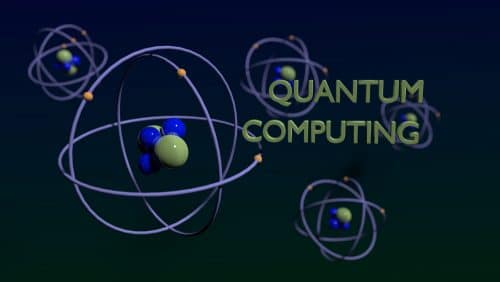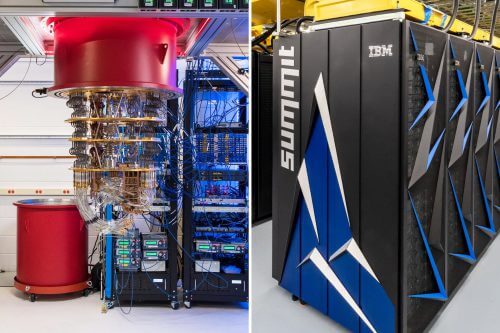The race for quantum computing, and for who will set the standards, is largely reminiscent of the competition between Thomas Edison, Nikola Tesla and George Westinghouse who will dominate the new invention - Edison's direct current and Westinghouse's alternating current.

A few weeks ago the movie "War of Current" was released. Recommended film about the competition between Thomas Edison, Nikola Tesla and George Wassinghouse who will control the distribution of the new invention, electricity, throughout the United States. The year is around 1880, Edison who invented the light bulb not long ago, is trying to build power stations using direct current DC, compared to Wassinghaus who is trying to build power stations using alternating current AC. It is very clear from the film that the alternating current is much more efficient and cheaper than the direct current, the problem was how to produce it easily and how to reduce its tremendous voltage so that it can be used to operate machines without them burning. The person who managed to find solutions for this is the creative physicist Nikola Tesla. Wessinghouse recognized Tesla's potential and worked with him to take over the distribution of electricity across the United States. Thus began a kind of war between Edison and Wessinghouse over which current should be used. Edison's direct current or Wassinghaus's alternating current. This struggle was not always pretty, but it reminds me of a kind of "writer's jealousy" between inventors and engineers. This war of currents moved the human race forward by developing more sophisticated methods of how to use this newly discovered power - electricity. Throughout the 19th century, physicists like Faraday and Maxwell understood more and more what electricity is, how it can be created and what its properties are. And here at the end of that century, this war of currents makes humanity succeed in controlling the production of electricity and distributing it. First across the United States and then around the world. Edison, who insisted on the direct current, lost to the better method, the alternating current, and thus began a new era in the world.

And here today I am reading about what looks like the war for power, the XNUMXs version.
We are facing a new era. The quantum computing revolution. A normal computer calculates using only two letters, 0 and 1, there is no current \ there is current. Two letters are enough to calculate anything, the question is how fast. If the calculation takes ten thousand years, we have a problem. Quantum computers are supposed to be much faster than ordinary computers. A quantum computer takes advantage of the peculiarities we discovered in quantum theory, in which a particle, such as an electron, can be in several places at the same time as long as its position is not measured. To remind you, moving electrons are electricity, so now the meaning of there is current\ there is no electric current, changes. If we manage to control this strange situation called superposition (superposition) we can do a lot of calculations simultaneously. The electric current will be in one area of the processor as well as in the second and third area according to the amount we need to quickly complete the calculation.
We are not there yet, the field is in diapers. Although there are already quantum computers, they are still relatively small and simple. Just like at the end of the 19th century, the topic of electricity was in its infancy. But already today physicists and engineers are trying to achieve "quantum supremacy" - a situation in which a quantum computer will be able to outperform the most advanced supercomputer in the world. On October 23, 2019, Google published an article in Nature magazine in which it announced that it had succeeded in achieving quantum supremacy with the help of the quantum computer it developed, a computer called Sycamore. According to her, the computer was able to solve in 200 seconds a calculation so complicated that today's most advanced supercomputer would take 10,000 years to solve!
This supercomputer is the IBM Summit computer. Within a few hours after the publication of the article, the IBM company announced in response that one should be skeptical about Google's achievement and that its supercomputer would only take two and a half days to solve the same calculation and not ten thousand years.
Reminds you of something?
Are we at the beginning of a new war of currents, between Google and IBM, only that this time it is a war over normal computation versus quantum computation?
So who is right, Edison or Wassinghouse? Sorry.. IBM or Google?
What is better, normal current or quantum current?
It seems that Google. The quantum computation she introduced presents a revolution. Because the exact time it takes for computers to calculate doesn't really matter. What is more important is the fundamental difference that Google managed to make. This difference is called something like "high speed polynomial calculation" versus "slow exponential calculation". These technical names are criteria for the complexity of the calculation, meaning what happens as the computer is able to calculate larger and larger numbers? If the computer slows down a lot and takes much longer to produce an answer, the calculation is said to be slow and if, despite the large numbers, the calculation speed will still be similar to the calculation speed with small numbers, then the computer is said to be fast. Google's achievement is
that the Sycamore quantum computer was able to calculate at a high polynomial speed (the speed will remain high even when the number that needs to be calculated is increased) compared to any other normal computer, such as the world's largest IBM supercomputer, which is exponentially slow (it will slow down as the number increases).
The conclusion is that ordinary computers do not have much of a chance against quantum computers. The normal computers will eventually not be able to cope with the complexities of the calculations and will be much slower than quantum computers. Just like direct current is not efficient enough compared to alternating current, so quantum computers will be much faster than normal computers. If IBM continues to stick only to normal computers they will lose the new battle for the current, just like Edison.
It will take time for us to feel this revolution and for quantum computers to become useful and distributed to private homes, but that day will come as the widespread use of electricity eventually reached the whole world (and if we try to estimate how long it will take according to the story of electricity, I would bet something like a century) .
More of the topic in Hayadan:
Edison, Tesla and Westinhouse: The War of the Currents
Return of electrical technology previously pioneered by Thomas Edison
IBM unveiled a first-of-its-kind integrated quantum computing system for commercial use
Israel will invest in a quantum computing system for security issues

8 תגובות
What guarantees us that the result is correct?
Perhaps the analogy between Edison's and Westinghouse's war of currents and IBM's and Google's computers is not the most accurate, but we still got a recommendation for a great movie (at least for those who have ever wondered why alternating current is better than direct current) and an undoubtedly interesting article.
1 or 0 is there current or no current? Definately not. It's if there is high *voltage* or low *voltage*
An embarrassing article
to such a site
Like IBM
They don't understand the importance
The quantum computer
They themselves develop it vigorously
And they already have a model that is open to everyone
access in the cloud
Strange that such an article is approved
Wow, what did I just read? A fine Greek salad.
Let's ignore for a moment everything written in the article and refer only to the question that arises in it, which is better - a quantum computer or a classical one? So this is a dumb question. Each of them has its uses. If we go for a moment to the current analogy, then direct current powers all our electronic devices, and alternating current mainly leads the electricity to homes and operates motors or heating elements. A quantum computer is good for solving certain kinds of problems, but no one is going to send email, work in Excel, or play computer games on a quantum computer.
The author of the article probably does not understand what quantum computing is. A quantum computer is not intended to replace a normal computer, it is a completely different type of calculation. There is a very specific type of problems like NP that ordinary computers do not know how to solve efficiently but in theory are very suitable for quantum computation. If they finally succeed in creating practical quantum computers, they will be an important addition to the computing power, but we will never perform the 1+1 exercise on a regular calculator that will do it faster than any quantum computer.
It's a shame you didn't bother to point out that IBM has also been investing a lot of resources in the development of quantum computers for years. The whole story here is forced, I expect that a site that honors the name of science will try to provide content with knowledge that is not invented by the writer.
What a salad!
The question is who will determine the standard for quantum computing or which computer is better quantum or normal?
- "The race for quantum computing, and for who will determine the standards, is reminiscent to a large extent of the competition between Thomas Edison"
- "Are we at the beginning of a new war of currents, between Google and IBM, only that this time it is a war over ordinary computation versus quantum computation?"
We hear from the article that Google claims that the future is in a quantum computer and IBM thinks that a 'super ordinary' computer